Mount Popa (Near Bagan)
Mt. Popa is about 50km away from Bagan. It takes about 45 minutes drive from Nyaung Oo Airport, Bagan.
Mt. Popa is an extinct volcano that is estimated to have erupted for the final time, over three hundred and twenty thousand years ago. However, popa’s attraction today lies not so much in its geological aspect, but more in its religious and mystical interests which are still prevalent. Popa is popularly recognized as an abode of many "Nats".
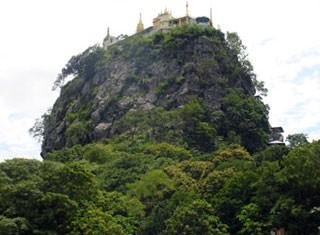
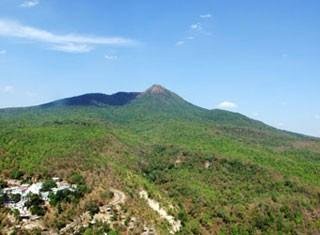
H.L. Chhibber in his publication "The Igneous Rocks of the Mount Popa Region", described it as "being in all respects an ideal example of a recently extinct volcano, suitable for text-book illustration. The main mountain originally had a circular crater, but the whole of the north-western side was blown away, probably by the final paroxysmal outburst, which suggests that the last eruption must have projected its discharge inclined to the sides of the volcano in that direction. The present mountain is, therefore shaped like a horse-shoe, and it is possible to walk into the crater through the breach in the northern wall."Although the mountain appears to be a single peak from a distance, it is in fact a series of peaks; the highest points being 4981, 4801 and 4501 feet above sealevel. The main mass of Mt. Popa rests on a level plateau, roughly 1000 feet above the surrounding plains, and about 1800 feet above sealevel. The actual volcano rises about 3000 feet from this base. On the extremity of the south-western slopes lies the extremely precipitous isolated peak known as the "Taung-ga-Lat". Some believe that this could be part of the main volcano, that was blown apart and landed as though plugged at its present location. Others theorize that it represents the infilled neck or plug of a subsidiary volcano.
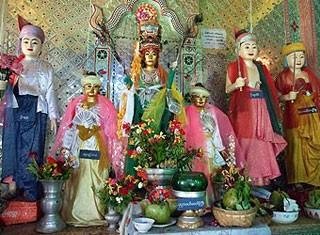
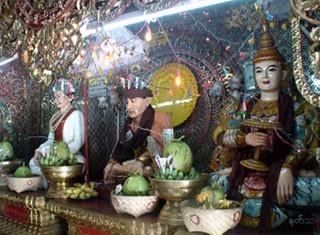
Whatever the theories may be, it is evident from the abundance of petrified trees within the Bagan area, and the extent of huge boulders strewn far and wide around the mountain, that this was once a land of violent explosions, turbulent earth movement and massive lava flows in ancient times, which caused the existing forests to be buried under. It is no a wonder then, that the mountain had also been historically known, as the "Dormant Fire Mountain".
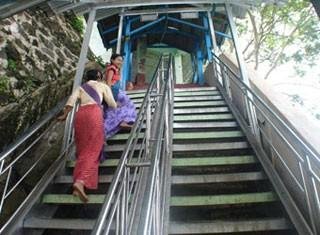
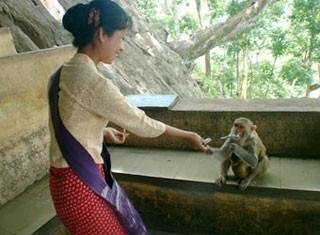
However, popa’s attraction today lies not so much in its geological aspect, but more in its religious and mystical interests which are still prevalent. Popa is popularly recognized as an abode of many "Nats" (spirits of ancient ancestors) who dwell in various parts of the mountain. In the days of old, it also used to be referred to as the "Mountain of Spirits". The evidence of these beliefs is abundant in the form of "nat shrines", leg- ends, rituals, ceremonial offerings, annual representative festivals, and the never- ending stream of pilgrims and believers in mysticism. Popa today is one of the most popular pilgrimage spots in the country. One would need to spend a sizeable amount of time in order to unearth the spiritual and legendary wealth of this sacred mountain.
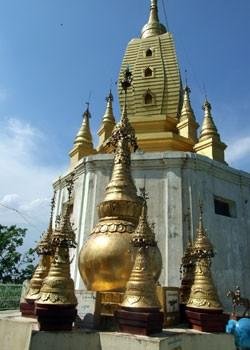
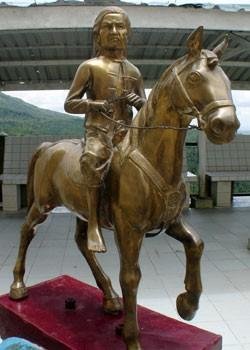
For more information about the Nats, please see Nat Pwe, in Festivals category.
Travel Tips
Some 50 km southeast of Bagan, Mount Popa, 1,500 metres high, is an extinct volcano. It is the legendary home of the 'nats' or spirits. The Mount Popa area has also been designated as a National Park, a perfect place for eco-tourism.
Congratulations @atz! You have completed some achievement on Steemit and have been rewarded with new badge(s) :
Click on any badge to view your own Board of Honor on SteemitBoard.
For more information about SteemitBoard, click here
If you no longer want to receive notifications, reply to this comment with the word
STOPHi! I am a robot. I just upvoted you! I found similar content that readers might be interested in:
http://myanmartravelinformation.com/around-bagan/mt-popa.html
intresting post @biggy345
Thank U